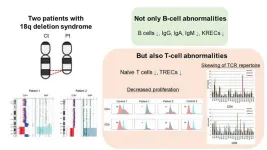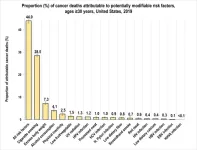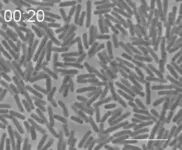(Press-News.org) Tokyo Medical and Dental University (TMDU) researchers have discovered that patients with 18q deletion syndrome can experience both cellular and humoral immunodeficiency
Tokyo, Japan – Chromosome 18q deletion (18q del) syndromeis a rare genetic condition disorder, affecting approximately 1 in 40,000 to 55,000 individuals, caused by the deletion of genetic material on the long arm of chromosome 18. This genetic anomaly disrupts normal growth and development, and critically, can impair the immune system's functionality. Patients with 18q del syndrome often exhibit humoral immunodeficiency or a common variable immunodeficiency (CVID)-like phenotype, characterized by low levels of immunoglobulins (antibodies) in the blood, compromising the body's ability to effectively combat infections.
Now, however, in a study published recently in the Journal of Clinical Immunology, researchers from Tokyo Medical and Dental University (TMDU) and Kagoshima University have identified a previously undocumented manifestation among patients with 18q del syndrome: late-onset combined immunodeficiency (LOCID), affecting both B and T cells. This novel finding underscores the critical importance of routinely assessing the functionality of both B and T cells in individuals with 18q del syndrome.
Elaborating further on this novel finding, Professor Kanegane says, “In this study, we came across two patients with chromosome 18q del syndrome presenting with LOCID, which, to the best of our knowledge, has not yet been reported in patients with the syndrome.”
Patient 1 was a 29-year-old man diagnosed with 18q del syndrome. Despite initially having few infections, he developed Pneumocystis pneumonia (PCP). Array-based comparative genomic hybridization (CGH) analysis showed a deletion in the 18q21.32-q22.3 chromosome region.
Patient 2 was a 48-year-old woman who had not been previously diagnosed with 18q del syndrome. However, she was diagnosed with granulomatous lymphadenitis, and a biopsy of her lymph nodes revealed a loss of 18q21.33-qter.
Both patients exhibited hypogammaglobulinemia, characterized by abnormally low levels of immunoglobulins (IgG, IgA, IgM, and IgE). Patient 1's serum immunoglobulin levels were significantly below normal ranges. He reported IgG of 188 mg/dL (normal: 870–1,700 mg/dL), IgA of 105 mg/dL (normal: 110–410 mg/dL), IgM of 26 mg/dL (normal: 33–190 mg/dL), and IgE of <5 IU/mL (normal: 232 IU/mL). His CD4+ T cells had a decreased percentage of naïve T cells, accounting for only 3.58% of the total CD3+CD4+ cell population. Moreover, his T-cell receptor excision circles (TREC) levels and Ig κ-deleting recombination excision circle (KREC) levels were extremely low at 25.27 copies/105 cells (normal: > 565 copies/105 cells) and 93.36 copies/105 cells (normal: ≥ 456 copies/105 cells) respectively, indicating poor T-cell production.
Similar conditions were noted for patient 2, who reported IgG of 8 mg/dL, IgA of 9 mg/dL, IgM of 131 mg/dL, and IgE of 0.3 IU/mL. Her CD4+ T cells and naïve CD4+ T cells were depleted, with naïve T cells accounting for only 6% of the CD3+CD4+ cell population. Her TREC levels were 0 copies/105 cells, and her KREC levels were 11.4 copies/105 cells.
Importantly, CD4+ and CD8+ T cells failed to divide in response to phytohemagglutinin (PHA) stimulation, indicating severe functional impairment of T cells in both the patients.
Based on their immune profiles and clinical history, both of them were diagnosed with LOCID, a condition where both humoral (antibody-mediated) and cell-mediated immune responses were impaired, making them highly susceptible to infections.
This novel finding is significant, as Dr. Tomomasa, the co-authored of this study, states, “While cases involving deletion of the same region as those of the two patients presented in this study have been reported earlier, patients with 18q del syndrome developing LOCID have never been reported. We speculate that these patients simply have not yet developed LOCID or that they might not have been adequately assessed for it."
On the basis of these results, the researchers recommend annual testing for both cellular and humoral immunity in patients with 18q del syndrome. This proactive approach can allow for the early detection of combined immune deficiencies, facilitating timely interventions and personalized treatment strategies. Ultimately, such regular monitoring can significantly improve clinical outcomes and enhance the quality of life for individuals diagnosed with 18q del syndrome.
###
The article, “18q Deletion Syndrome Presenting with Late-Onset Combined Immunodeficiency,” was published in the Journal of Clinical Immunology at DOI: 10.1007/s10875-024-01751-4
END
On June 30, 2024, SciOpen 2.0 was officially launched. Developed by Tsinghua University Press, SciOpen initially made its debut in June 2022 as an international digital publishing platform for STM journals. After two years of global operation and continuous iterative upgrades, SciOpen 2.0 has fully embraced the best practices of mainstream publishing models. SciOpen has completed a comprehensive upgrade of its interactive system design and has integrated advanced large-model AI reading capabilities, marking a significant leap forward in its functionality.
These updates steer SciOpen towards ...
(Toronto, July 11, 2024) JMIR Publications invites submissions to a new theme issue titled “Artificial Intelligence in Oncology” in its premier open access journal JMIR Bioinformatics and Biotechnology indexed in PubMed Central and PubMed, SCOPUS, Sherpa/Romeo, DOAJ and EBSCO/EBSCO Essentials.
Artificial intelligence (AI) has the potential to revolutionize oncology by enhancing diagnostic accuracy, personalizing treatment plans, predicting patient outcomes, and accelerating drug discovery. Researchers, clinicians, and industry experts are invited ...
A new study led by researchers at the American Cancer Society (ACS) finds four in 10 cancer cases and about one-half of all cancer deaths in adults 30 years old and older in the United States (or 713,340 cancer cases and 262,120 cancer deaths in 2019) could be attributed to modifiable risk factors, including cigarette smoking, excess body weight, alcohol consumption, physical inactivity, diet, and infections. Cigarette smoking was by far the leading risk factor, contributing to nearly 20% of all cancer cases and 30% of all cancer deaths. The findings are ...
The study by researchers from the French national public health institute aimed to identify priority pathogens that could be suitable for wastewater surveillance (WWS) during the Paris 2024 Olympic and Paralympic Games taking place from 26 July to 11 August and 28 August to 8 September, respectively. The pathogens were evaluated using a Delphi method which integrated evidence from peer-reviewed publications and expert opinion.
WWS has become more prominent due to its role during the COVID-19 pandemic. As a non-intrusive, cost-effective surveillance tool, WWS offers ...
Dense E.coli bacteria have several similar qualities to colloidal glass, according to new research at the University of Tokyo. Colloids are substances made up of small particles suspended within a fluid, like ink for example. When these particles become higher in density and more packed together, they form a “glassy state.” When researchers multiplied E.coli bacteria within a confined area, they found that they exhibited similar characteristics. More surprisingly, they also showed some other unique properties not typically found in glass-state materials. This study contributes to our understanding of glassy “active matter,” a relatively new field of ...
Weill Cornell Medicine has received $4.2 million to study how the immune system in some people infected with HIV can keep the virus under control, which could lead to novel therapeutic strategies for thwarting or eliminating HIV. Dr. Brad Jones, associate professor of immunology in medicine in the Division of Infectious Diseases at Weill Cornell Medicine, was awarded a MERIT grant from the National Institute for Allergy and Infectious Diseases (NIAID) at the National Institutes of Health (NIH).
The “Method for Extending Research in Time” (MERIT) grant provides ...
According to Science Alert, neuroscientists from Johns Hopkins University have recently discovered a new treatment for Parkinson's disease using an FDA-approved cancer drug. A recent study published in Neuroscience Bulletin reveals the genetic cause of Parkinson's disease. The study discovered that a mutation in the Cysteinyl-tRNA synthetase (CARS) gene (c.2384A>T; p.Glu795Val; E795V) is responsible, offering a new path for prevention and control of the disease. This research was conducted by a team led by Zhang Jianguo, including researcher ...
People tend to become less narcissistic as they age from childhood through older adulthood, according to a study published by the American Psychological Association. However, differences among individuals remain stable over time -- people who are more narcissistic than their peers as children tend to remain that way as adults, the study found.
“These findings have important implications given that high levels of narcissism influence people’s lives in many ways -- both the lives of the narcissistic individuals themselves and, maybe even more, the lives of their families and friends,” said lead author Ulrich Orth, PhD, of the University of Bern in Switzerland.
The ...
A group of scientists have released a landmark report on glacial geoengineering—an emerging field studying whether technology could halt the melting of glaciers and ice sheets as climate change progresses.
The white paper represents the first public efforts by glaciologists to assess possible technological interventions that could help address catastrophic sea-level rise scenarios.
While it does not endorse any specific interventions, it calls for a “major initiative” in the next decades to research which, if any, interventions could and should be ...
New York, NY (July 11, 2024) – The Icahn School of Medicine at Mount Sinai is embarking on biomedical research aiming to set new standard-of-care protocols for treating alopecia areata and atopic dermatitis in people with Down syndrome, or trisomy 21.
Emma Guttman-Yassky, MD, PhD, the Waldman Professor and Chair of Dermatology at Icahn Mount Sinai, has been awarded more than $4 million for a five-year National Institutes of Health (NIH) R61/R33 grant to evaluate the long-term safety, efficacy, and mechanisms of medications known as JAK inhibitors in patients with Down syndrome. The medications have been approved ...








